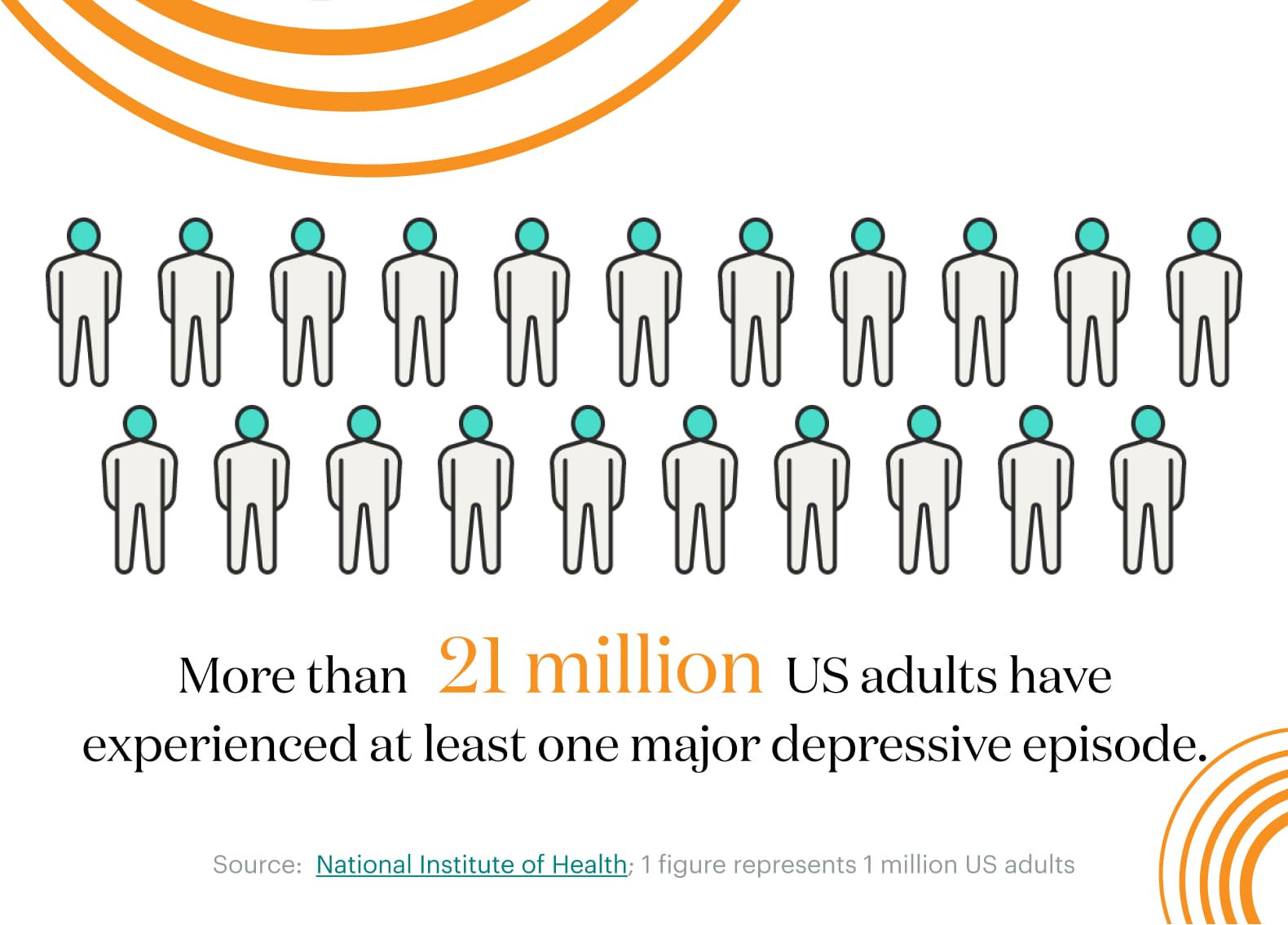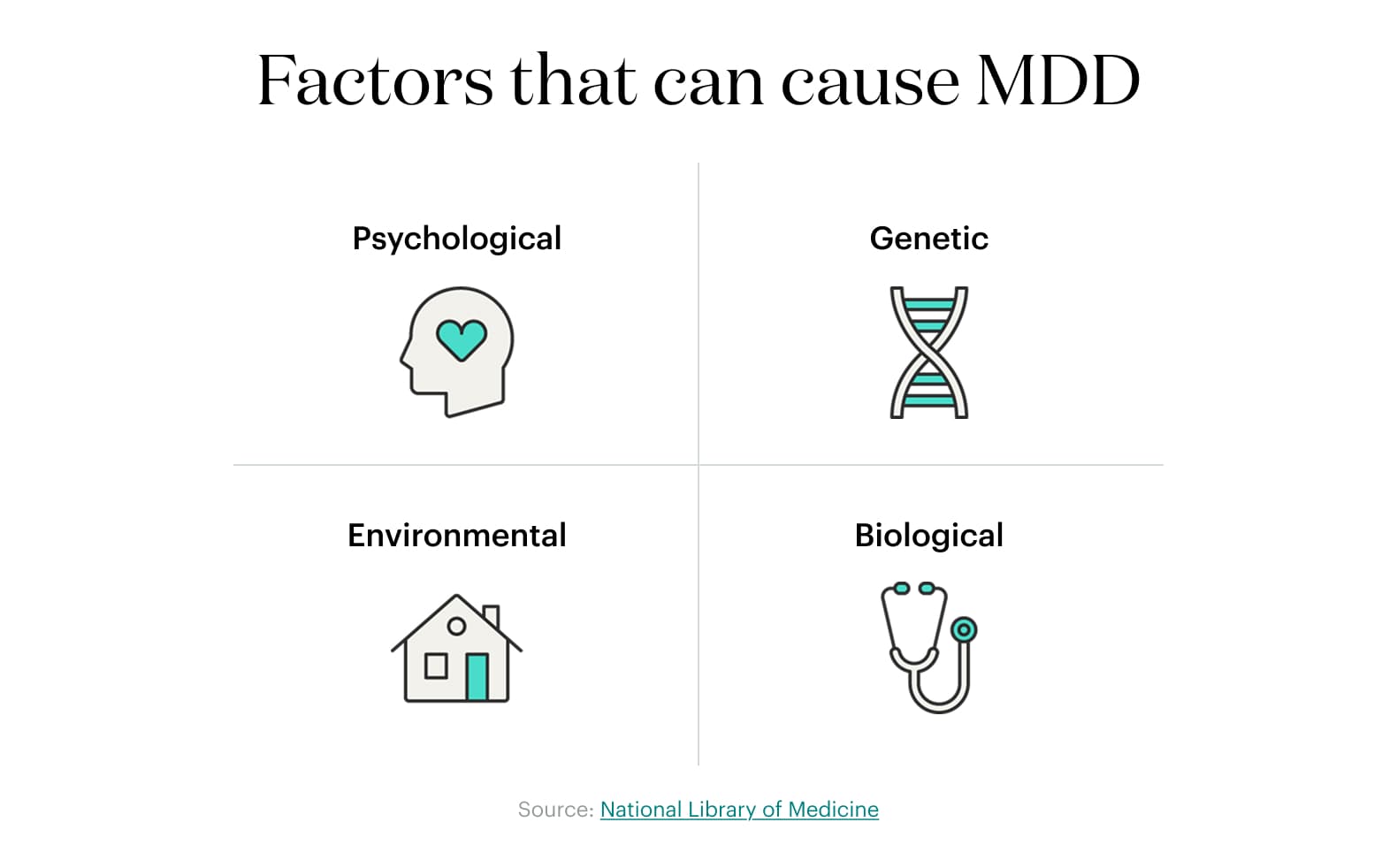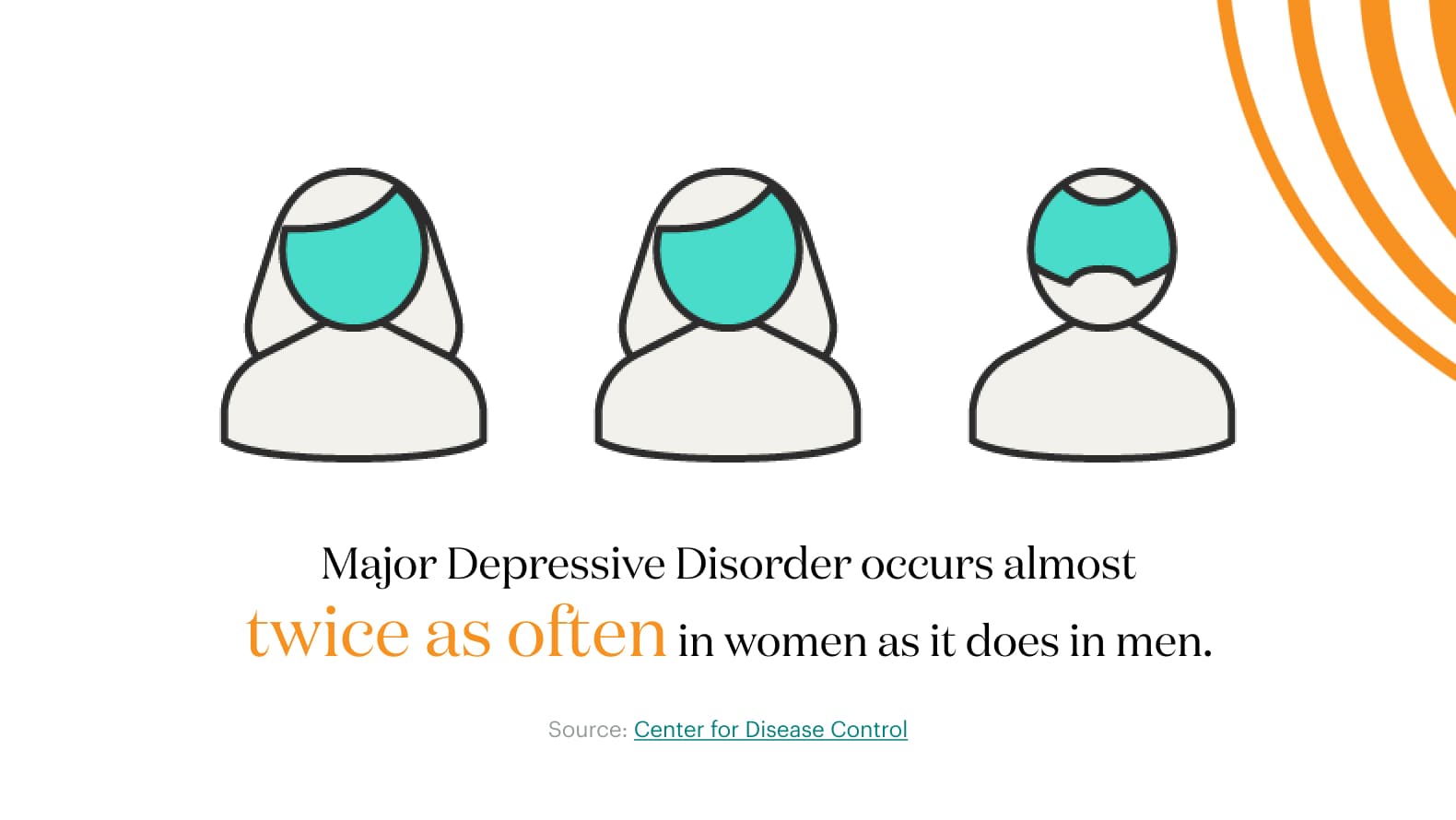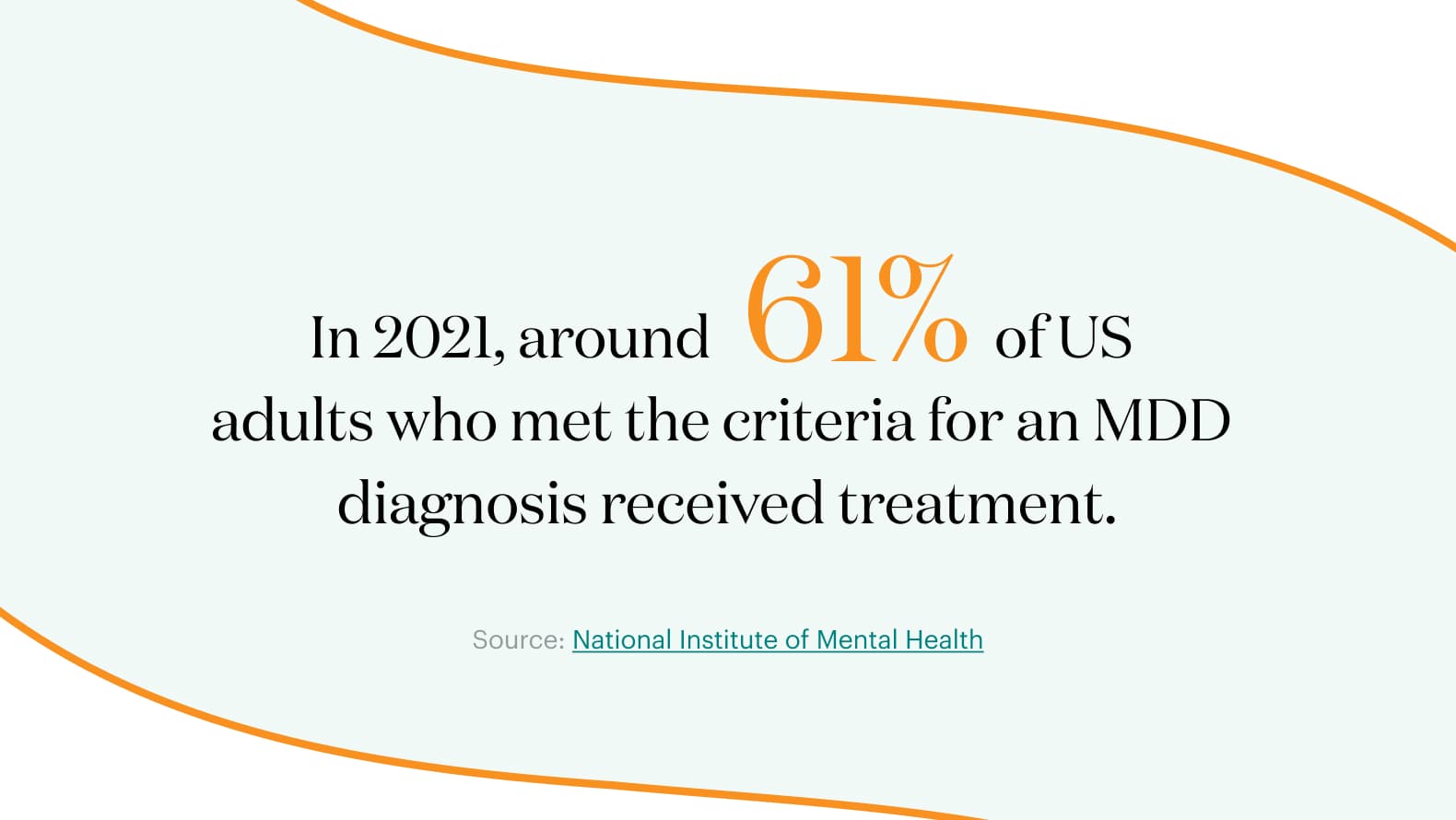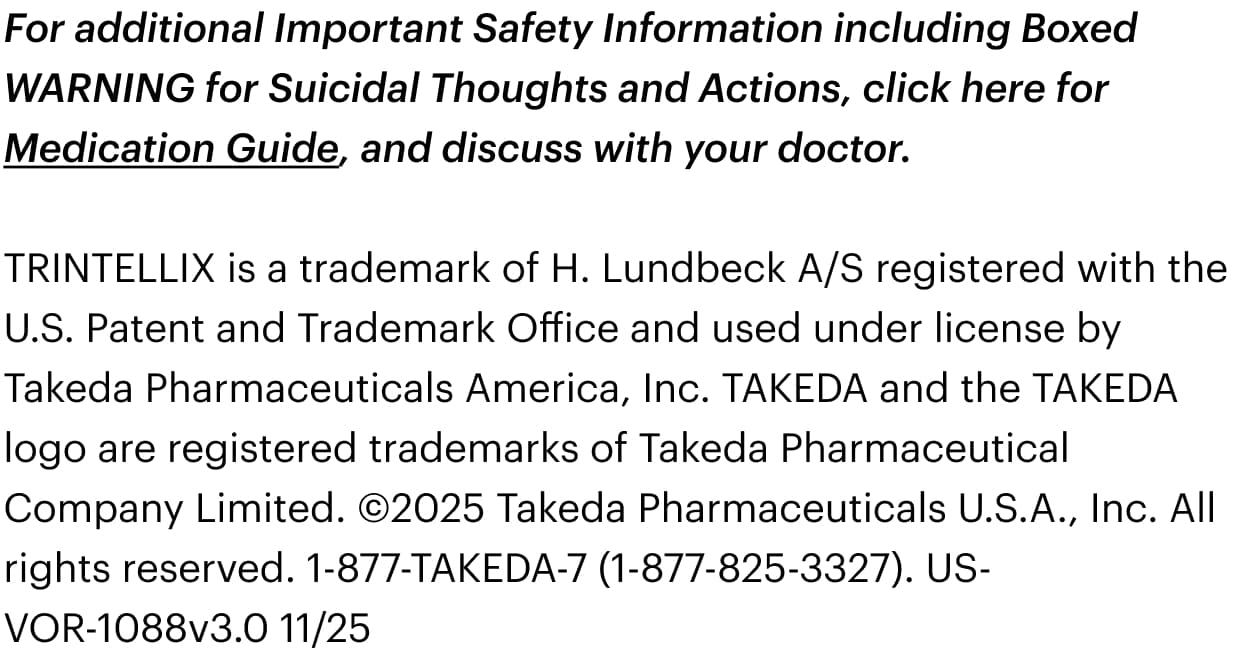In case you haven’t heard, ogres (and people) are like onions. They have layers. Take April. She’s a newly married veteran, nature lover, boot camp regular, and one of the more than 21 million adults living with Major Depressive Disorder (MDD) in the US.
The Major Depressive Disorder Basics
MDD is a clinically diagnosed type of depression that manifests as a complicated set of symptoms. Think, for example: depressed mood, loss of interest or pleasure in almost all hobbies or activities that were once enjoyed, weight loss or weight gain, insomnia or hypersomnia, restlessness or moving slowly, fatigue, feelings of worthlessness or excessive guilt, trouble thinking clearly, and recurrent thoughts of death or suicide. The tricky part? Everyone experiences MDD differently. You don't have to have all of these symptoms to have MDD, and you might have some of them and it still might not be MDD. Only a health care professional can diagnose and treat MDD.
If you are thinking about suicide, reach out to the 988 Suicide & Crisis Lifeline by texting or calling 988.
What Made April Seek Treatment
April grew up on a small farm in South Dakota. At 18, she joined the military to help pay for college. But after 9/11 and her first month of freshman year, she was deployed. “It was around that time when I learned that depression actually has multiple symptoms, and my doctor told me that I had a type of depression called Major Depressive Disorder,” April remembers. “I felt sad often, had trouble thinking clearly, lost interest in things I once enjoyed, and felt tired — like I was moving very slowly.”
After a decade of feeling like this and cycling through many different doctors and therapists, she felt she was ready for a change. So, she left the military and set out to work for a humanitarian organization based in Afghanistan that provided basic needs and life skills to civilians, from bringing electricity to a rural mountain town to providing women in villages with sewing machines so they could earn income.
But things didn’t go as planned. “After a few weeks on my mission, I realized I couldn’t manage my symptoms alone,” April says. “That was my ‘aha’ moment. I needed my support system — my family, friends, doctor, and therapist — to help me manage my MDD.” Once she got back to the United States, her family and friends described her as seeming empty or hopeless. That’s when she spoke to a psychiatrist about what she was going through.
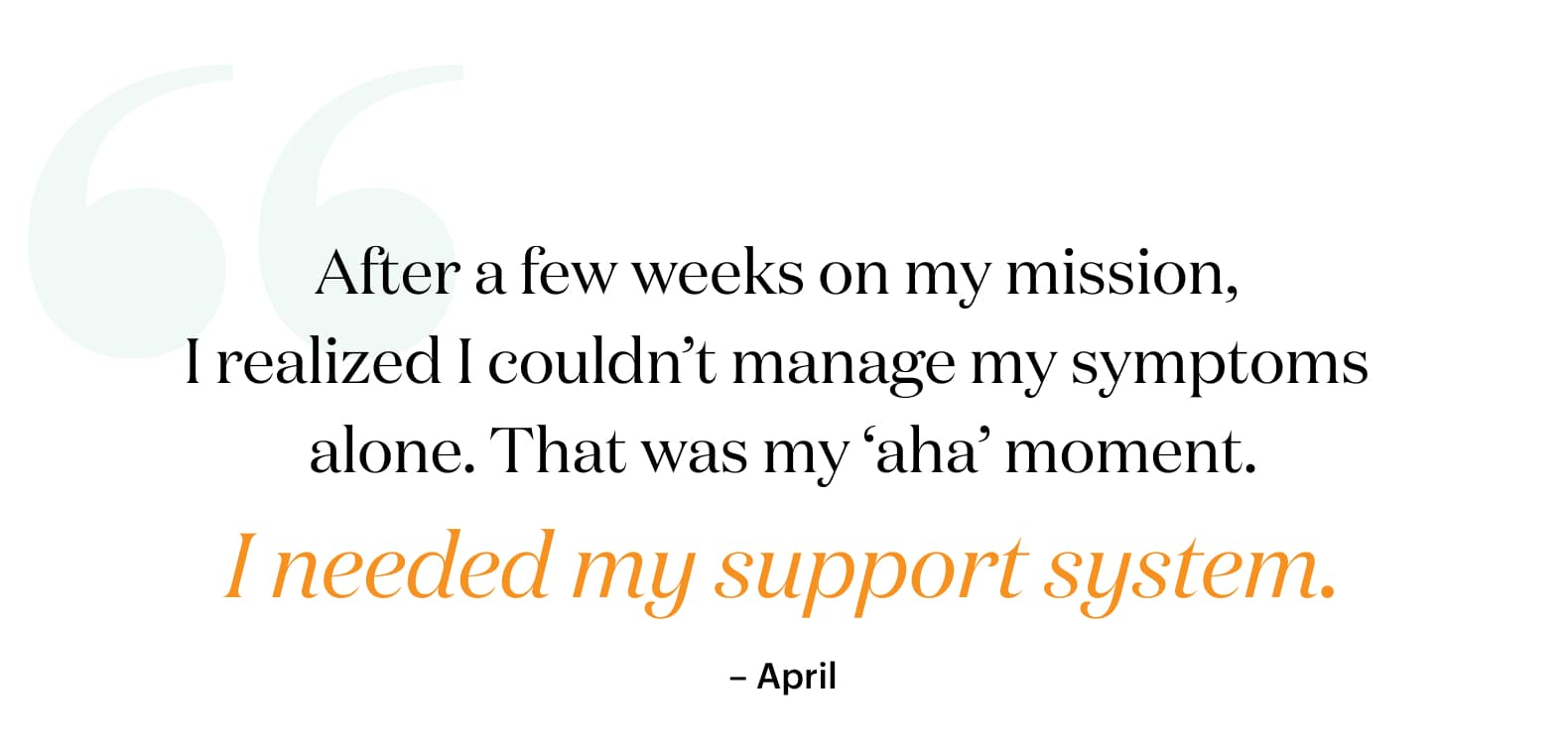
What Makes Major Depressive Disorder Different
It’s not uncommon for feelings of sadness or difficulty focusing to impact someone’s work, social, or other daily activities. But with MDD, symptoms typically last for at least two weeks. Without stopping. These periods are called “episodes.”
MDD has no singular cause. But those with a family history of depression or a serious medical condition may be at a higher risk. Same goes for those in high-stress environments, going through major life events, or experiencing loss. MDD also happens to be more common among women than men. (Yeah, we know.)
How to Treat Major Depressive Disorder
There are several types of treatments available for people living with MDD. Keep in mind that the same treatment plan won’t work for everyone. And it might take some time to land on the right one. Based on April’s symptoms, her psychiatrist recommended a combination of talk therapy and Trintellix® (vortioxetine), which is a prescription medicine used to treat MDD in adults, but has not been shown to be safe and effective for use in children.
April’s psychiatrist told her that in multiple short-term studies, Trintellix was shown to help reduce the overall symptoms of MDD, based on an overall score on a standardized depression rating scale compared to sugar pill.
April's doctor shared treatment results from two additional studies that showed that adult MDD patients experiencing a major depressive episode treated with Trintellix showed improvement in processing speed (how quickly a person can accurately process information). This is an aspect of cognitive function can be affected by depression. The improvement in processing speed may be the result of an improvement in depression. No studies have been conducted to see whether Trintellix is any better at improving processing speed than other antidepressants.
Trintellix did not have a significant impact on weight in short-term studies and during a 6-month phase of a long-term study of patients who had previously responded to Trintellix when compared to patients taking a sugar pill. Some reports of weight gain have been received since product approval and also in a separate long-term study.
In another clinical study Trintellix was compared to escitalopram (another antidepressant also known as Lexapro®) in patients whose MDD was adequately treated but who were experiencing sexual side effects while taking their selective serotonin reuptake inhibitor (SSRI) antidepressant. Those patients who were switched to Trintellix experienced significantly fewer sexual side effects compared to those switched to escitalopram. Both of these medications maintained antidepressant efficacy. Sexual side effects have been reported with Trintellix.
She also explained to April what she could expect while taking Trintellix and described the benefits and risks, like how Trintellix increases the risk of suicidal thoughts and actions in people 24 years of age and younger.
April’s psychiatrist also advised her that she should call or get emergency help right away if she has new or sudden changes in mood, behavior, thoughts or feelings, if she develops suicidal thoughts or actions, or if she has or develops symptoms that are new, worse, or worry her. Her psychiatrist also said that she shouldn’t take Trintellix if she’s allergic to vortioxetine or any other ingredients in Trintellix, or if she’s taking, or has stopped taking within the last 14 days, a medicine called a Monoamine Oxidase Inhibitor (MAOI), including the antibiotic linezolid or intravenous methylene blue.
April’s doctor explained that while antidepressants are known to be effective based on clinical trials, there are also potential side effects of these types of medications, including nausea, vomiting, weight gain, changes in sleep, treatment-emergent sexual dysfunction (TESD), and suicidal thoughts and actions.
The most common side effects of Trintellix are nausea, constipation, and vomiting. Serious potential side effects include serotonin syndrome, increased risk of bleeding, manic episodes, discontinuation syndrome, eye problems, low levels of salt (sodium) in your blood, and sexual problems. These are not all the possible side effects of Trintellix.
How These Treatments Work
Chemicals in the brain called neurotransmitters control your mood and stress levels. Antidepressants are thought to work by improving the way your brain uses these chemicals. SSRIs are the most commonly prescribed, but there are also serotonin norepinephrine reuptake inhibitors (SNRIs), among others.
A health care provider can help people with MDD find the medication that's right for them. They can also help them identify triggers that worsen their symptoms, learn new behaviors that limit episodes, and stick to their treatment plan. “I have good days and I have bad days, but with talk therapy and Trintellix, I feel my MDD is pretty well-managed,” April says. (Psst…visit Trintellix.com to hear more patient stories like April’s and get access to other patient resources.)
What Else Helps April Manage Her MDD
In addition to her talk therapy and medication, April finds ways to stay proactive when it comes to doing things that make her feel good, like trail running, enjoying the outdoors, and going on walks with friends and family. Learning to set boundaries has also made a difference. “Sometimes I need quiet time and I need to recharge. I show up so much better when I have some time for myself doing the things I love most,” she says.

Exercising regularly and seeking support can help. Others with MDD manage their symptoms by meditating regularly, eating a balanced diet, and prioritizing sleep. Plus setting small, achievable goals that can build on each other over time.
theSkimm
April's story is just one person's personal experience, and Major Depressive Disorder can look different for different people, as can an effective treatment plan. But it almost always includes being open with your loved ones, consulting a health care professional, and finding the right medication. Note, that medication may not be right for every person with MDD.
PS: April is a paid contributor for Takeda Pharmaceuticals. Her last name's been withheld to protect her personal privacy.
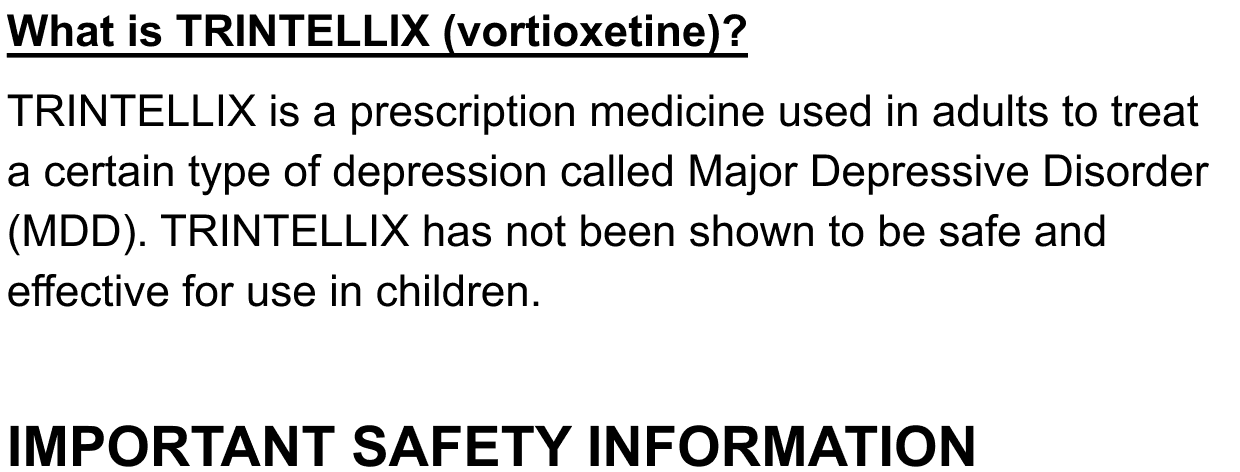

Subscribe to Skimm Well
Sign up here to receive our wellness newsletter filled with actionable advice, expert-vetted content, product recs, and more — delivered directly to your inbox.

